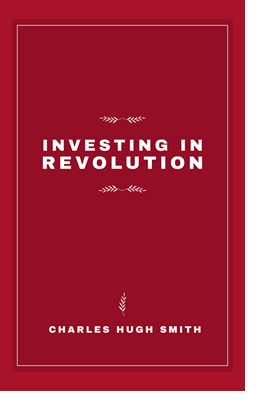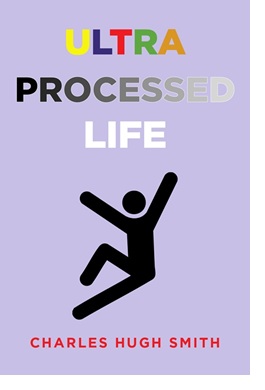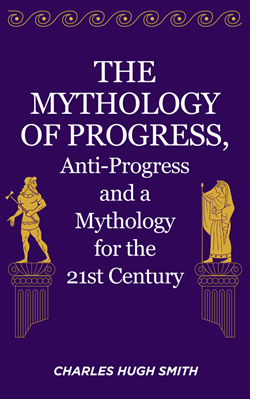

|
 |

The War March 1, 2026
That I don't have an analysis or insight to offer doesn't mean I don't care. It simply means there are limits on what we know, and what we do know suggests circumspection.
War seems to demand some response--opinion, analysis, insight--lest it seem that we're uncaring or detached from events so consequential. But if there is anything we can say with any certainty about war, it's that nobody outside the inner circle knows anything, and the inner circle's knowledge is partial, contingent, and prone to the interpretive distortions of group-think. The other thing we can say with certainty is the primary task of those in charge of the war is perception management, to shape-shift the fog of war into narratives supported by images and statistics that lend an air of factual certainty to something that was as carefully curated as an advert campaign designed to persuade us to buy into whatever story of the war suits those in charge. Since nobody has a truly comprehensive grasp of what's going on--and what passes for comprehension has been filtered, either purposefully for perception management, or by the biases born of previous experience--any opinion, analysis, or insight is a claim for some measure of certainty that dismisses the inherent contingencies of fast-moving events that depend to some irreducible degree on where one is standing. War fighting, perception management, analysis and policy-making are professions that are fraught with biases, group-think, blind spots and all the unknowns, from the known-unknowns to the unknown-unknowns, and everything in between. One of the few certainties is that no one involved is anxious to publicly admit they made a mistake. Another thing we can surmise with reasonable certainty is that few of those in charge of war have any high-quality understanding of the enemy. In a recent weekend post that referenced the Vietnam War, I discussed the consequences of the American leadership's profound ignorance of Vietnam's complex history, politics or culture, and their catastrophic belief that surveillance photos and statistical analyses were substitutes for actual knowledge. Consider the experience of Admiral Isoroku Yamamoto of the Imperial Japanese Navy prior to World War II. He attended Harvard for two years, and served as a naval attache in Washington, D.C. for years. He traveled extensively in the U.S., taking special interest in the oil fields of Texas and the industrial infrastructure of Detroit. This on-the-ground experience informed his hesitancy to engage in a long war of attrition with the U.S. and his view that a surprise attack that crippled American power in the Pacific was the best chance of securing a negotiated peace. But this proved to be a false reading of the American character, as the one thing a surprise attack took off the table was a negotiated peace. It's remarkably easy to drift into an abstract, view-from-orbit take on war. First-hand accounts of war tend to bring us back to Earth. One of our elderly Japanese friends was drafted as a teen to work in an underground munitions factory late in World War II. High-born to a wealthy family, she was given a Naval rank and uniform at 16 years of age, supervising the old men and boys assembling artillery shells in tunnels bored deep into the mountain to escape American bombs. I have a copy of my uncle's list of his 33 B-24 and B-17 missions over Germany and German-occupied territory in the 8th Air Force in World War II, all in 1944 and early 1945. Given the fierce flak and German fighters, serving on a bomber crew was to some degree often akin to a suicide mission, as losses were so high that by one estimate only 24% of crew members came through their 30 missions (later boosted to 35) alive and uninjured. Depending on the phase of the air campaign, estimates of casualties approach 50%. The 8th Air Force had more KIA (killed in action) casualties--26,000--than the entire U.S. Marine Corps, which endured horrendous casualties in its numerous island-hopping campaigns in the Pacific. A friend of mine served as a Loach helicopter pilot in the peak years of the Vietnam War. The Loach (Hughes OH-6 Cayuse) was a Light Observation Helicopter crewed by a pilot and gunner. The missions demanded flying at low altitude and therefore being exposed to ground fire, including shoulder-launched weaponry. Once again, these were to some degree often akin to a suicide mission. The casualty rate was so high that my friend said the old hands didn't even bother learning the names of the new pilots. My friend was shot down twice and had numerous near-misses with death. We don't do 50% casualty rates any more, as war--along with everything else--has gone high-tech. This greases the slide to war as an abstraction to be discussed as bloodlessly as a chess game or the price of oil. I don't have an analysis or insight to offer because I know nothing of any credible value. I suppose if one had access to the combined intel of Russia, China, the U.S., Israel, Turkey, Saudi Arabia and other regional interests, one might fashion a fairly coherent view of things on the ground. But even this would be contingent on events of the following day, and on the workings of people who are out of sight or lost in the inevitable summarizing of complex events. The irony here is I don't have an analysis or insight to offer because I know too much--not about this particular war, but about war in general. I understand the casino's tables are taking bets on the price of oil, and other tables are taking bets on other eventualities, but given that people are risking their lives to do their duty, I'm not interested in the casino. It reminds me of the Star Trek episode The Gamesters of Triskelion where disembodied pulsing brains bet quatloos on life and death combat. That I don't have an analysis or insight to offer doesn't mean I don't care. It simply means there are limits on what we know, and what we do know suggests circumspection. 
My new book Investing In Revolution is available at a 10% discount ($18 for the paperback, $24 for the hardcover and $8.95 for the ebook edition). Introduction (free) Check out my updated Books and Films. Become a $3/month patron of my work via patreon.com Subscribe to my Substack for free My recent books: Disclosure: As an Amazon Associate I earn from qualifying purchases originated via links to Amazon products on this site. THE REVOLUTION TRILOGY: Investing In Revolution Ultra-Processed Life The Mythology of Progress Systemic Problems/Solutions Investing In Revolution (2025) Introduction (free) The Mythology of Progress (2024) Introduction (free) Global Crisis, National Renewal (2021) Introduction (free) Money and Work Unchained (2017) Introduction (free) A Radically Beneficial World (2015) Introduction (free) What You Can Do Yourself Ultra-Processed Life (2025) Introduction (free) Self-Reliance in the 21st Century (2022) Introduction (free) When You Can't Go On: Burnout, Reckoning and Renewal (2022) Introduction (free) Get a Job, Build a Real Career and Defy a Bewildering Economy (2014) Intro (free) Novels The Adventures of the Consulting Philosopher Intro (free) The Secret Life of an Asian Heroine First chapters (free) Become a $3/month patron of my work via patreon.com. Subscribe to my Substack for free Investing In Revolution print $18, (Kindle $8.95, Hardcover $24 (145 pages, 2025)  Only now do we see that we've been investing in revolution for decades--not the revolutions we thought we were investing in, revolutions in technology and finance, but in the social revolution made inevitable by the extremes that we've reached in our single-minded pursuit of private gains.
Only now do we see that we've been investing in revolution for decades--not the revolutions we thought we were investing in, revolutions in technology and finance, but in the social revolution made inevitable by the extremes that we've reached in our single-minded pursuit of private gains.
The pendulum that we've pushed to an extreme will swing to the opposite extreme, and the artifices that have propped up a facade a stability for decades will accelerate the disorder rather than reverse it. We now stand at the point of decision, and this book offers a path to a reformation and renewal that serves the shared interests of us all, not just the few. Introduction (free) Ultra-Processed Life print $16, (Kindle $7.95, audiobook, Hardcover $20 (129 pages, 2025)  Ultra-Processed Life: the substitution of a synthetic, commoditized, very profitable facsimile for what was once authentic.
Ultra-Processed Life: the substitution of a synthetic, commoditized, very profitable facsimile for what was once authentic.
Ultra-Processed Life is my term for everything that is analogous to ultra-processed snacks: attractively marketed, instantly alluring, easy to consume, addictive by design, tasty in the moment but harmful over time, its origins a black box of unknown processes, the brightly colored product bearing no resemblance to the real-world ingredients, an idealized form of what is inherently imperfect, untethered from the natural world. As with many others, the catalyst for my exploration was a life-threatening medical crisis that did not have a specific cause. This led me to wonder if our entire way of life is like an ultra-processed snack: tasty but not healthy, edible but stripped of the nutrients we need to be healthy, addictive by design. Introduction (free) The Mythology of Progress, Anti-Progress and a Mythology for the 21st Century print $20, (Kindle $9.95, Hardcover $24 (215 pages, 2024) audiobook, Read the Introduction and first chapter for free (PDF)  What if the policies to accelerate growth are no longer working because our fix for every problem--growth at any cost--is failing? We're told Progress is inevitable as a result of technology, but everyday life is getting harder, not easier--the opposite of Progress, what I call Anti-Progress.
What if the policies to accelerate growth are no longer working because our fix for every problem--growth at any cost--is failing? We're told Progress is inevitable as a result of technology, but everyday life is getting harder, not easier--the opposite of Progress, what I call Anti-Progress.
What if the real source of the unraveling is far deeper than economics or politics? What if the problem is what we see as the inevitable destiny of humanity--Progress--is actually a modern mythology, disconnected from the real-world consequences of growth for growth's sake? We indignantly reject that Progress is a mythology, but our need for mythology hasn't gone away because we've mastered technology; we've created a modern mythology of technology that is heedless of its own consequences. To truly progress, we need a new mythology aligned to 21st century realities. Read the Introduction and first chapter for free
Recent entries: The War March 1, 2026 The Decay of our Quality of Life No Longer Aligns with the Narrative February 26, 2026 How We Got Here: Moral Flexibility Leads to Moral Decay February 25, 2026 Money Is Funny That Way: The Case for USD Supremacy February 23, 2026 What Defines a "Good Economy"? Social Mobility and Not Losing Ground February 20, 2026 Small Business in the TINA Economy: Competing for the Scraps February 17, 2026 What Few Understand About Money February 12, 2026 Self-Employment Series #2: Ownership Is Not Freedom February 11, 2026 A Market Crash and Recession Are Bullish, Not Bearish February 10, 2026 The Banality of Evil and Those Who Said No February 8, 2026 Re-Set: Reversing the Debt-Debasement Death-Spiral February 5, 2026 Owning Your Work in a World That Rents Your Life February 3, 2026
Power and Impunity
February 2, 2026

Contributions/subscriptions are acknowledged in the order received. Your name and email remain confidential and will not be given to any other individual, company or agency. All contributors are listed below in acknowledgement of my gratitude.
Mastery requires reading and doing.
Of Two Minds Site Links home musings my books archives books/films policies/disclosures social media/search Aphorisms How to Contribute, Subscribe/Unsubscribe sites/blogs of interest original music/songs Get a Job (book) contributors my definition of success why readers donate/subscribe to Of Two Minds mobile site (Blogspot) mobile site (m.oftwominds.com)
HUGE GIANT BIG FAT DISCLAIMER: Nothing on this site should be construed as investment advice or guidance. It is not intended as investment advice or guidance, nor is it offered as such.... (read more) WHY EMAIL TO THIS SITE IS READ BUT MAY NOT BE ACKNOWLEDGED: Regrettably, I am so sorely pressed for time and energy that I am unable to respond to the vast majority of emails. Please know I read all emails, but I can only devote a very limited number of hours to this blog and all correspondence.... Subscriptions to the Weekly Musings Reports Subscribers enable Of Two Minds to post free content. Without your financial support, the free content would disappear for the simple reason that I cannot keep body and soul together on my meager book sales alone. Your financial support is very much appreciated. Subscribers ($7/mo) and those who have contributed $70 or more annually receive weekly exclusive Musings Reports ($70/year is about $1.35 a week). Each weekly Musings Report offers four features: 1. Exclusive essay on an extraordinarily diverse range of insightful topics 2. Summary of the blog this week 3. Best thing that happened to me this week 4. From Left Field (a curated selection of interesting links) There are four easy ways to subscribe: Substack, Patreon, US Mail and Paypal: How to Contribute, Subscribe/Unsubscribe to Of Two Minds What subscribers are saying about the Musings: "What makes you a channel worth paying for? It's actually pretty simple - you possess a clarity of thought that most of us can only dream of, and a perspective that allows you to focus on the truth with laser-like precision." Jim S. Thank you very much for supporting oftwominds.com with your subscription or contribution.
Extra-Special Bonus Aphorisms:
"There is no security on this earth; there is only opportunity." (Douglas MacArthur) "We are what we repeatedly do." (Aristotle) "Do the thing and you shall have the power." (Ralph Waldo Emerson) "Any intelligent fool can make things bigger, more complex, and more violent. It takes a touch of genius and a lot of courage to move in the opposite direction." (E.F. Schumacher, via Tom R.) "He who will not risk cannot win." (John Paul Jones) "When we drink coffee, ideas march in like the army." (Honore de Balzac) "Progress is not possible without deviation." (Frank Zappa, via Richard Metzger) "Victory favors those who take pains." (amat victoria curam) "The man who has a garden and a library has everything." (Cicero, via Lee Bentley) "A healthy homecooked family meal and a home garden are revolutionary acts." (CHS) "Do you know what amazes me more than anything else? The impotence of force to organize anything." (Napoleon Bonaparte) "The way of the Tao is reversal" Or "Reversal is the movement of Tao." (Lao Tzu) "Chance favours the prepared mind." (Louis Pasteur) "Success consists of going from failure to failure without loss of enthusiasm." (Winston Churchill) "Where there is ruin, there is hope for treasures." (Rumi) "The realm of gratitude is boundless." (CHS, 11/25/15) "History doesn't have a reverse gear." (CHS, 12/22/15) Smith's Law of Conservation of Risk: Every sustained action has more than one consequence. Some consequences will appear positive for a time before revealing their destructive nature. Some consequences will be intended, some will not. Some will be foreseeable, some will not. Some will be controllable, some will not. Those that are unforeseen and uncontrollable will trigger waves of other unforeseen and uncontrollable consequences. (July 8, 2014)(thanks to Lew G. for retitling the idea.) Smith's Neofeudalism Principle #1: If the citizenry cannot replace a kleptocratic authoritarian government and/or limit the power of the financial Aristocracy at the ballot box, the nation is a democracy in name only. The Smith Corollary to Metcalfe's Law (The Network Effect): the value of the network is created not just by the number of connected devices/users but by the value of the information and knowledge shared by users in sub-networks and in the entire network. (CHS, 4/6/16) My Credo of Liberation: I no longer care if the power centers of our society--the distant, fortified castles of our financial feudal system--are changed by my actions, for I am liberated by the act of resistance. I am no longer complicit in perpetuating fraudulent feudalism and the pathology of concentrated power. I no longer covet signifiers of membership in the Upper Caste that serves the plutocracy. I am liberated from self-destructive consumerist-State financialization and the delusion that debt servitude and obedience to sociopathological Elites serve my self-interests. (Thank you, Klaus-Peter L., for reminding me) "We've become a culture of excuses rather than solutions: solutions always require sustained effort and discipline." (CHS 4/9/16) "Fraud as a way of life caters an extravagant banquet of consequences." (CHS 4/14/16) "Creativity = problem solving = value creation." (CHS 6/4/16) "Truth is powerful because it is the core dynamic of solving problems." (CHS 7/21/17) "We live in a system of human emotions that masquerades as a science (economics)." (CHS 1/1/18) "Always remember, your focus determines your reality." (George Lucas) "Diversity is for poor people. Sameness is for the successful." (GFB) "When power dissipates suddenly, it dissipates completely." (CHS 7/14/19) "Disobedience is the true foundation of liberty. The obedient must be slaves." (Henry David Thoreau) "Markets cannot price in the value of non-monetized natural assets such as diverse ecosystems." (CHS 7/14/19) "Magical thinking isn't optimism, it is folly." CHS 1/3/22) "Tune in (to self-reliance), drop out (of hyper-consumerism and debt-serfdom) and turn on (to relocalizing capital and agency)." (CHS 1/5/22) "The path to everything you desire starts here: like yourself as you are right now." (CHS 11/20/22) "There are only two signals: how many essentials you produce and share and if you're consuming less with better results. Everything else is noise." (CHS 12/17/22) "Liberation is no longer needing any confirmation or feedback from others or the world for one's sense of self. Wealth, fame, recognition, admiration, praise, prestige, approval, sainthood, martyrdom, success: none are needed, none are desired." (CHS 12/26/22) "When fame, wealth, prestige, status and glory are out of reach, you're free to pursue other more valuable things." (CHS 2/6/22) "It is the sacred duty of every activist who seeks to better their community to grow and share as much life-giving food as is humanly possible." (CHS 6/15/23) "Being anonymous, gray and unknown is the ideal state of freedom." (CHS 3/15/24) "We seem to have entered a world of anti-leisure and anti-productivity in which the unpaid shadow work demanded to keep all the complicated digital bits in motion obliterate our leisure and productivity." CHS (5/22/24) "It is axiomatic that failing systems work the best just before they fail catastrophically." Ray W. "Looking younger is mere technique; thinking younger demands creativity." CHS (10/16/24) "Tell me what's taboo and I'll tell you the truths that threaten the status quo." CHS (12/15/24) "This is the core of the Attention Economy: the ultimate addiction is the addiction to ourselves." CHS (1/28/25) "If You Seek the Truth, Look for What's Taboo." CHS (7/18/25) "My definition of self-reliance: the less you need, the easier it is to get what you need." CHS (7/26/25) "Mastery requires reading and doing." CHS (7/28/25) "The replacement of authentic value, quality, agency, choice, trust, legitimacy and experience with self-serving facsimiles is the key dynamic of Ultra-Processed Life, my term for the present-day human condition." CHS (8/12/25) "Ultra-Processed Life replaces an authentic experience with a synthetic, simulated, commoditized, highly profitable version that's superficially attractive but destructive over the long term." CHS (8/12/25) "What we see everywhere is the replacement of authentic things--including democracy--with synthetic facsimiles designed to maintain the illusion of choice and value." CHS (8/12/25) "Sometimes certainty is the enemy we don't even see and uncertainty is our most faithful ally." CHS (9/20/25) |
 |
||||||||||
|
All content, HTML coding, format design, design elements, original images, videos and musical compositions
and recordings on www.oftwominds.com are protected by copyright © 2026 Charles Hugh Smith, All global rights reserved in all media, unless otherwise credited or noted.
Terms of Service:
All content on this blog is provided by Trewe LLC for informational purposes only. The owner of this blog makes no representations as to the accuracy or completeness of any information on this site or found by following any link on this site. The owner will not be liable for any errors or omissions in this information nor for the availability of this information. The owner will not be liable for any losses, injuries, or damages from the display or use of this information. These terms and conditions of use are subject to change at anytime and without notice.
Our Use of Generative AI Tools Policy:
Our Privacy Policy:
PRIVACY NOTICE FOR EEA INDIVIDUALS
Notice of Compliance with
The California Consumer Protection Act
Regarding Cookies:
Our Commission Policy:
|
|
|
|||||
| home email me (no promise of response, sorry, here's why) mirror site | |||||